Chengdu, capital of Sichuan province, is a city you never want to leave once you arrive. There’s just so much to do and see in the ‘Land of Abundance’. A visit to see the cute ‘China’s treasure’ of giant pandas is a must; the city is also rich in historical legacies, local food and shopping.
Discover Chengdu
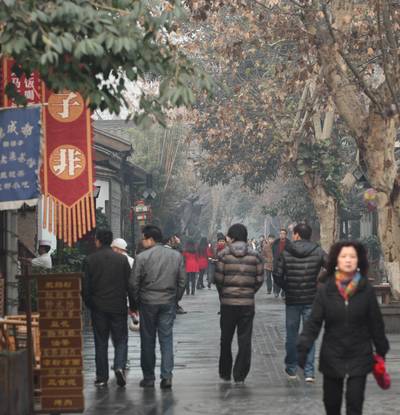
The history of Wide and Narrow Alley goes as far back to the Qing Dynasty (1644 - 1911 AD). It is one of Chengdu’s historical and cultural reserves and consists of Wide Alley, Narrow Alley, Jing ('well') Alley, and Quadrangle Courtyards.
The Wide Alley exhibits the leisurely life of natives and represents the most typical forms of Chengdu folk culture and the Narrow Alley mainly shows the courtyard culture of the city and courtyard dreams of Chinese people with Well Alley adopting a more modern environment and even houses a western villa. The villa was a private residence turned church and is now a site for love and marriage consumption, and representative of sweetness and fashion.
Needless to say, local food, arts and crafts, pubs and bars and a host of local experiences abound in this popular tourist spot.
Address: East of Tongren Rd., west of Changshun St., Qingyang District, Chengdu, Sichuan, China
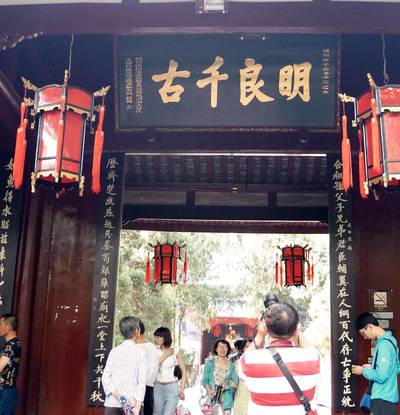
The temple of Marquis Wu is situated in the southern part of Chengdu .It was built by Li Xiong of the Western Jin Dynasty in memory of Zhuge Liang, prime minister of the Shu kingdom. ReNovemberations took place during the Qing Dynasty (1644-1911) and the main buildings include Liu Bei Hall and Zhuge Liang Hall.
In the shrine there are 47 historic figures and sculptures of the Shu kingdom, some 40 steel and stone tablets, more than 30 plaques and dozens of ancient tripods, incense burners, bells, drums and other relic. The most valuable and famous table dates back to 805AD and is 144 inches high and 37 inches wide. It is known as the Table of Triple Success.
The architectural of the temple is complex yet interesting and steeped in history, and the park has old cypress trees. The main section of the temple is divided into five sections namely The Gate, The Second Date, The Hall of Liu Bei, The Corridor and The Wuhou Temple also known as The Hall of Zhuge Liang.This is a popular destination with tourists.
Address: China, Sichuan, Chengdu, Wuhou, Wuhouci St, 231号附2号
Tel: +86 28 8553 5951
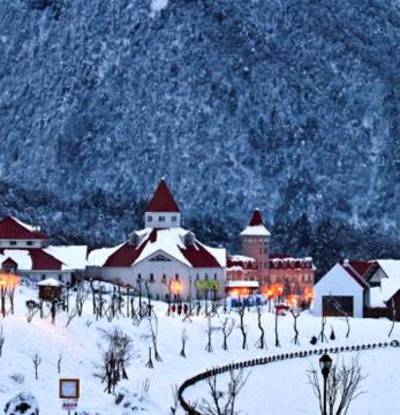
Fancy a bit of ‘chill’ and fun-time in the snow. Make a trip to Xiling Snow Mountain. There is a distinct distribution of the vegetation zones that present different scenes in different seasons. The scenic area has three spectacles – Rizhaojinshan (The Sun Shines over the Golden Mountain), Yinyagjie (Yin and Yang Worlds), and Senlinfoguang (Buddhist Halo in the Forest).
The mountain is approximately 95 km from Chengdu town with some pretty good ski resorts to stay. Best time to be in this mountain is between April to August and snow cover period is four months (from early December to the end of March). A world natural heritage, Xiling Snow Mountain is the highest peak in Chengdu and the habitant area of Giant Panda.
Address: In the Dayi county, Chengdu city, Sichuan Province, China
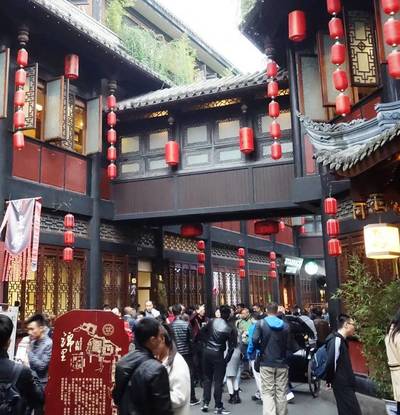
Right next to the Temple of Marquis Wu is Jinli Promenade, a rebuilt trading and folk art street imitating the ancient-style buildings in West Sichuan.
Dating back to the Qin Dynasty, Jinli Street in Chengdu, Sichuan Province, was in ancient times one of the busiest of commercial boulevards of the Kingdom of Shu, during the Three Kingdoms period. It is thus known as the "First Street of the Shu Kingdom."
Renovation of the street was completed at the end of 2004.Visitors from all over China and abroad gathered here in this ancient street to relax, take in the surroundings, and perhaps taste some of the local specialties. It is said that citizens of Chengdu are particularly fond of dining and socializing, and perhaps this is what helps to create the city's leisurely ambience. Chengdu has been newly designated as one of the ten most livable cities in China.
Address: 231 Wuhou Temple Avenue, Chengdi City, Sichuan Province, Sichuna Province, China
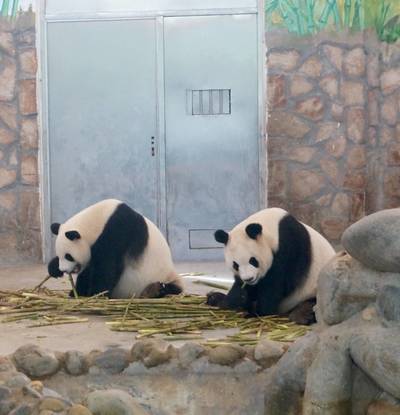
And who can resist catching or even having the opportunity to cuddle the world’s most lovable animal, the pandas! As the world’s famous giant panda ex situ conservation base, scientific research and breeding base, public education base and educational tourism base, the Chengdu Research Base of Giant Panda Breeding covers an area of about 247 acres, is 10 kilometers from downtown Chengdu and about 30 kilometers from Shuangliu International Airport. The Base, as the “giant panda ex situ conservation ecological demonstration project”, is famous for the protection and breeding of endangered wild animals that are unique to China, including giant pandas and red pandas. It is honored as “the national treasure’s natural paradise and the people’s land of idyllic beauty” for its beautiful environment of overlapping mountains, clean water, lush trees, and chirping birds.
It’s best to visit the base in the mornings as early as possible. You’ll see most action from the pandas between 8am and 11am – after that they’re likely to be sleeping. And, while you might not want to plan your whole trip around it, if you visit the base in September or October you’ll be able to see newborn pandas in the nursery.
Opening Hours: 7:30a.m. – 6:00p.m
Address: 1375 Panda Avenue, north of Chengdu, Sichuan Province, China
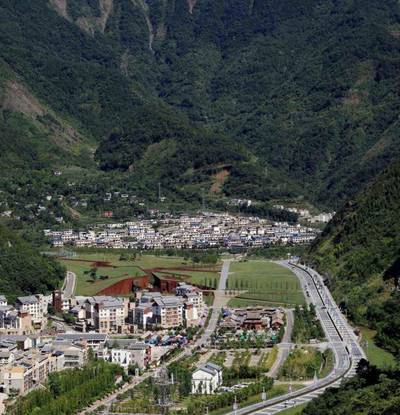
On 12 May 2008 the devastating earthquake in Sichuan Province of China destroyed thousands of lives within minutes. The affected area lies just a little more than one hundred kilometres north of Chengdu at the foot of the Himalayan Mountains. The earthquake left 4.8 million people homeless, more than 70,000 people were killed; 18,000 are still missing and 350,000 people were injured.
The national government immediately initiated a huge rebuilding programme to provide shelter and infrastructure.
One of the most severely hit areas was Beichuan County, where over eighty per cent of the buildings collapsed and more than 15,000 people were killed. Among the buildings that collapsed was the Beichuan Middle School in which more than 1000 pupils and teachers died. The government decided to build the National Earthquake Memorial on exactly that spot.
The architecture faculty of Tongji-University in Shanghai was given the commission to organize a competition among their faculty members. After several rounds of negotiations the first prize was awarded to Cai Yongjie, who proposed a memorial landscape with integrated museum. The integration of the buildings into the landscape was what finally persuaded the jury. To build a memorial without a dominant building and a huge square in front of it, is quite unusual in China and reflects the shock of all the decision makers.
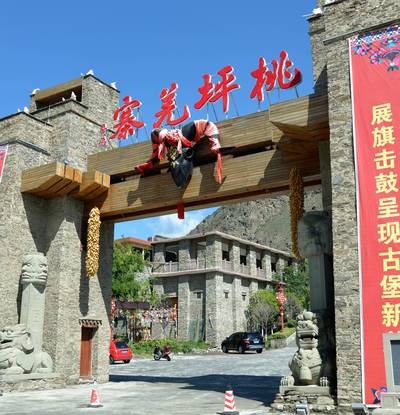
Driving about 180 km northwest from Chengdu, you can arrive at Taoping Qiang Village, which is a hot tourist spot on your way to Jiuzhai Valley. This village is the most well-preserved building group of watchtowers and folk houses all over the world, and it was built in 111 AD as the county pass and key defense area in West Han dynasty according to historic materials. Strolling in the village, you will be astonished by the so solid houses that compose like a maze. Visiting Taoping Qiang Village, you can experience its more than 2000-year history, see the original and pure life of Qiang people, and enjoy the local fantastic songs and dance, especially the multi-voice of high artistic value, also the talented Qiang embroidery of long history is another shining star of Qiang people.
Located 180 km northwest from Chengdu city, Taoping Qiang Village is the best place to appreciate the authentic watchtowers, the undisturbed Qiang village, the Qiang embroidery, music and dance of Qiang minority, pure life and rich culture of Qiang people in China.
Opening Hours: 7:30a.m. - 6:30p.m.
Address: Taopiing Township, Li County, Aba Tibetan and Qiang Autonomous Prefecture, Sichuan Province
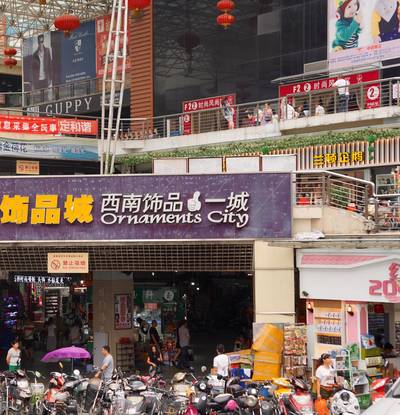
Lotus Pool Market is a large comprehensive wholesale market that you either love or hate. If you are looking to purchase cheap souvenirs by the bulk to take home or to sniff out that valued products at bargain prices, check out the shops in the inner buildings. In any event, Lotus Pool Market offers a wide selection of products from clothing, textiles, shoes, accessories, sports goods, arts, crafts and toys. With over 15,000 stalls, Lotus Pool Market is the main provider of stock for Chengdu’s smaller shops. There are also specialty shops such as home furnishing providing 24-hour tailoring for curtains with vast materials and fabrics to choose from. Be prepared to put your negotiation skills to work. Street vendors also abound in this area, selling everything from fried snacks to dried fruit to jewelry.
Opening Hours: 9:00a.m. – 5:00p.m.
Address: Beizhan Dong Yijie, Jinniu District, Chengdu
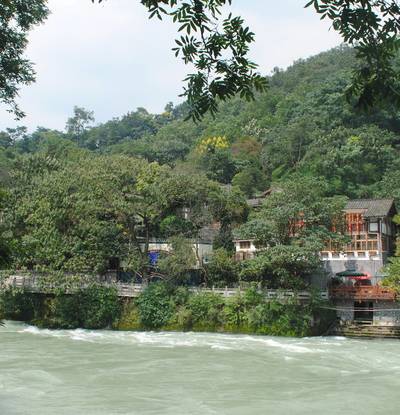
The Dujiangyan is an ancient irrigation system in Dujiangyan City, Sichuan, China. Originally constructed around 256 BC by the State of Qin as an irrigation and flood control project, it is still in use today. The dam attained its UNESCO Heritage Site status in 2000 and is certainly one of the world’s wonders. It was used to not only control flooding on the Min River, but also to irrigate an arid region on the other side of a mountain around Chengdu. Travel time to the dam from Chengdu may be a bit long. There are many ancient sites nearby including the Erwang Temple, built to worship Libing and his legendary son who helped designed the project. The statues of both men are featured in the temple.
Address: Dujiangyan, Chengdu, Sichuan, China
Tel: +86 400 115 1222



